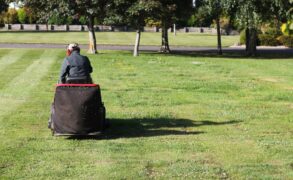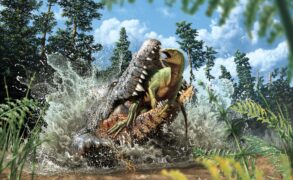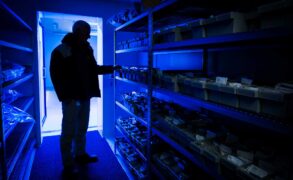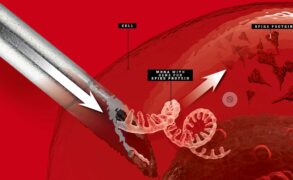
The smell of fresh-cut grass is an attack warning
We love the smell of fresh-cut grass. But in reality what we are smelling is a warning signal being released by plants under attack. The pheromones emitted by freshly-mown grass are known as…

Crocodile eats dinosaur!
Neutron imaging of delicate fossils reveals what an ancient crocodile had for dinner. The Australian Age of Dinosaurs Museum has announced the discovery of Confractosuchus sauroktonos, a new genus and species of ancient…

What is the world’s most toxic tree?
“I recently say a sign in Wingham Brush Nature Reserve, warning of giant stinging trees. Are there any trees more toxic than these?” The various species of Dendrocnide, such as the Dendrocnide excela…

New tool will help black-hole hunters re-examine old data
Astronomers have a new way of detecting active black holes and of measuring how much matter they are sucking in. Scientists say that the new technique can use existing data from telescopes to…

It’s Frog ID week – here’s how you can help
More than 240 frog species are under threat from climate change, bushfires, floods, habitat loss and degradation, and disease. You can help save them by taking part in the fourth annual FrogID Week, 12-21…

National Science Week is over – wasn’t it great!
National Science Week 2021 ran from 14 to 24 August, with this year’s festival incorporating thousands of events around Australia on science subjects as diverse as health, sport, technology, Indigenous health, farming, food,…

Synchrotron – Australia’s great ring of light
Greg Le Blanc and his team are some 22km south-east of the CBD in Melbourne, working underground in the middle of the night. In an enclosed room they huddle over monitor screens, while…

Could we use solar power to purify drinking water?
There has been significant recent research into the possibility of desalination using photo-thermal evaporators powered only by sunlight. The problem has been achieving an efficiency high enough to make such devices practical. Scientists…

Australia’s new leader in botanical science
Australia has a new scientific institute that brings together an astoundingly broad sweep of botanic research organisations and collections, services and facilities. The Australian Institute of Botanical Science is positioned to become a…

Your vaccines are ready – how they did it in under a year
More than 180 different COVID-19 vaccines were in the initial pipeline – and the majority of them can be placed in one of four vaccine categories. One is a classic. Two are comparatively…


